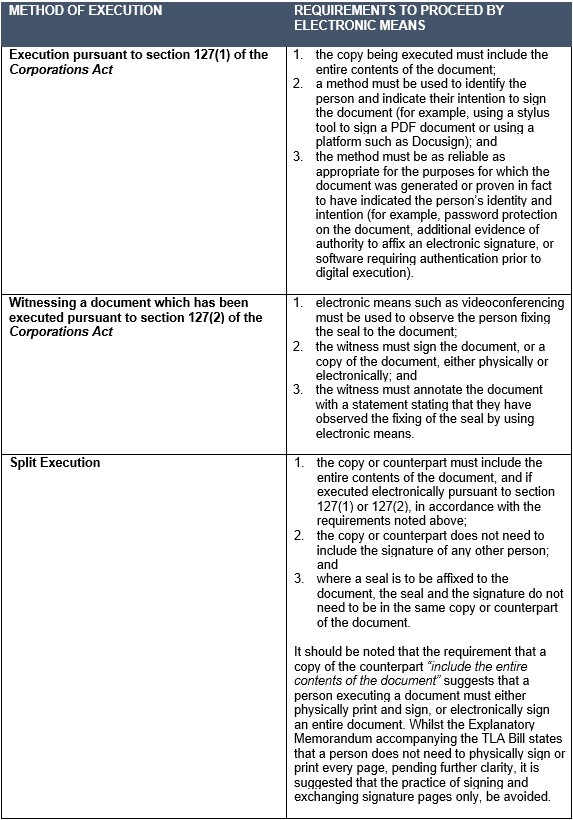Can I sign this electronically?
With the majority of New South Wales in lockdown, it has become increasingly difficult, and near impossible, for companies and individuals to arrange the physical signing and witnessing of documents.
It comes as no surprise therefore that temporary reforms introduced by the New South Wales and Federal Governments to modify the way we can sign and witness documents have been welcomed with open arms. However, with the rules on e-signing and witnessing documents constantly changing, it is important to understand what can and cannot be done electronically under the current legislation.
Witnessing and attestation by audio visual link
On 28 September 2020, the New South Wales Parliament extended the operation of provisions allowing the witnessing and attestation of various documents via audio-visual link. This extension was provided by the Stronger Communities Legislation Amendment (Courts and Civil) Act 2020 (NSW), which inserted a new part 2B into the Electronic Transactions Act 2000 (NSW) (ETA).
In accordance with part 2B of the ETA, documents including wills, deeds and agreements, affidavits and statutory declarations, can be witnessed electronically, so long as the following take place:
- the witness must observe the signing of the document in real time;
- the witness must confirm that they witnessed the signature, either by signing a counterpart of the signed document, or, where the signatory scans and sends a copy of the signed document to the witness electronically, by countersigning that document;
- the witness must include a statement on the document specifying the method used to witness the signature (for example, audio visual link) and state that the document was witnessed in accordance with section 14G of the ETA; and
- the witness must be reasonably satisfied that the document they sign is the same document, or a copy of the document, that they have observed the signatory sign.
Considering the amendments introduced into the ETA, it is important to remember that when executing a deed as an individual, your signature must be witnessed. Whilst this same obligation does not extend to agreements, having the signatures on an agreement witnessed can be useful for evidentiary purposes, and where possible, is recommended.
Whilst the provisions introduced into the ETA are set to expire on 31 December 2021, Attorney General Mark Speakman has indicated that the temporary implementation of part 2B of the ETA will allow the State Government to assess whether such provisions are effective, and ultimately determine whether such provisions should be made permanent.
It is no doubt that the provisions introduced into the ETA have been helpful in alleviating the difficulty of signing and witnessing documents during the pandemic, however with the Corporations Act 2001 (Cth) (Corporations Act) being excluded from operation of the ETA, where does that leave company officers?
The current position on electronic execution by company officers
On 10 August 2021, Parliament passed the Treasury Laws Amendment (2021 Measures No. 1) Bill 2021 (Cth) (TLA Bill).
The TLA Bill, which has been in effect from 14 August 2021, makes significant changes to section 127 of the Corporations Act. Whilst the TLA Bill does not replace the existing regime under section 127 for wet-ink signatures, it does confirm the adequacy under this section of electronic execution of company documents, split execution, and the remote witnessing of the affixing of a company seal, through electronic methods. The provisions introduced by the TLA Bill are currently in place until 31 March 2022.
Importantly, the changes introduced by the TLA Bill also apply to the execution of deeds, permitting company officers to follow the process provided for by the TLA Bill, in substitution of the established process of signing, sealing and delivery a deed, as under common law.
The following table provides a summary of how documents can be validly executed under the new provisions introduced into section 127:

Unfortunately, the above reforms introduced by the TLA Bill do not apply retrospectively. Accordingly, any company document which may have been signed electronically between 21 March 2021 and 14 August 2021, may not be considered to have been signed in accordance with section 127. It is unclear whether section 127, minus the facilitative amendments in the TLA Bill, permits electronic signing.
So, are these changes likely to stay?
Whilst the changes introduced by the TLA Bill are only in place until March 2022, the Federal Government has indicated that permanent reforms will be introduced once the provisions introduced by the TLA Bill expire, allowing company officers to e-sign documents as they please.
Also see:
Queries
If you have any questions about this article, please get in touch with an author or any member of our Banking & Finance team.
Disclaimer
This information and the contents of this publication, current as at the date of publication, is general in nature to offer assistance to Cornwalls’ clients, prospective clients and stakeholders, and is for reference purposes only. It does not constitute legal or financial advice. If you are concerned about any topic covered, we recommend that you seek your own specific legal and financial advice before taking any action.
